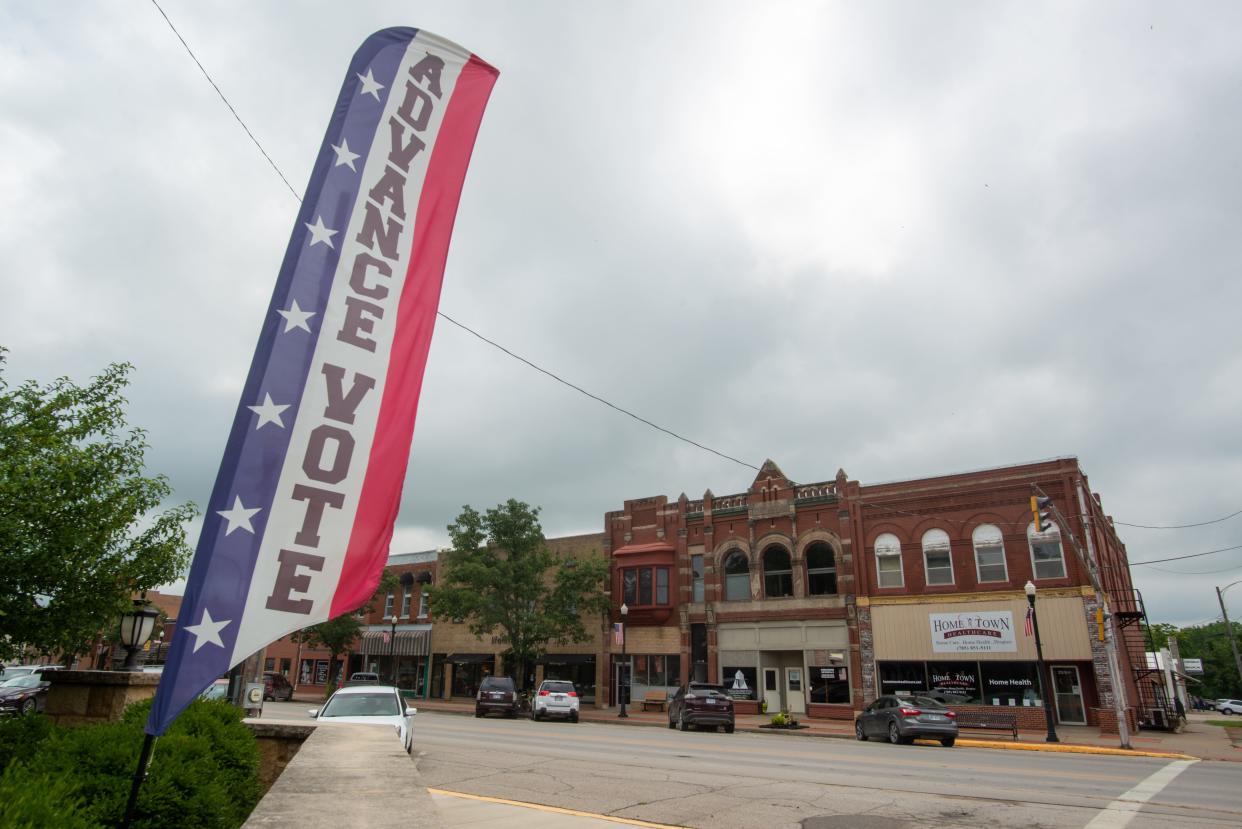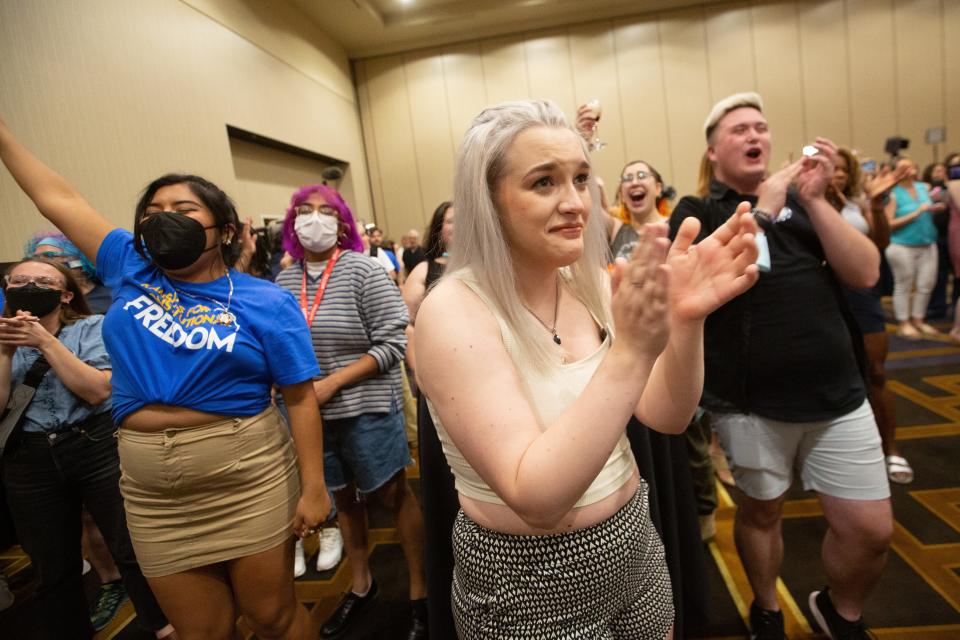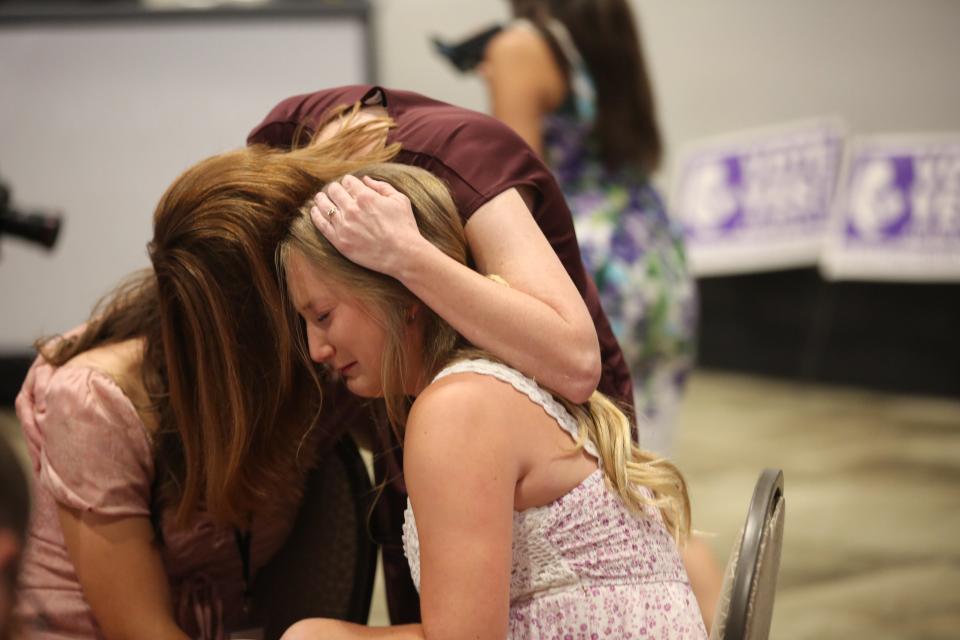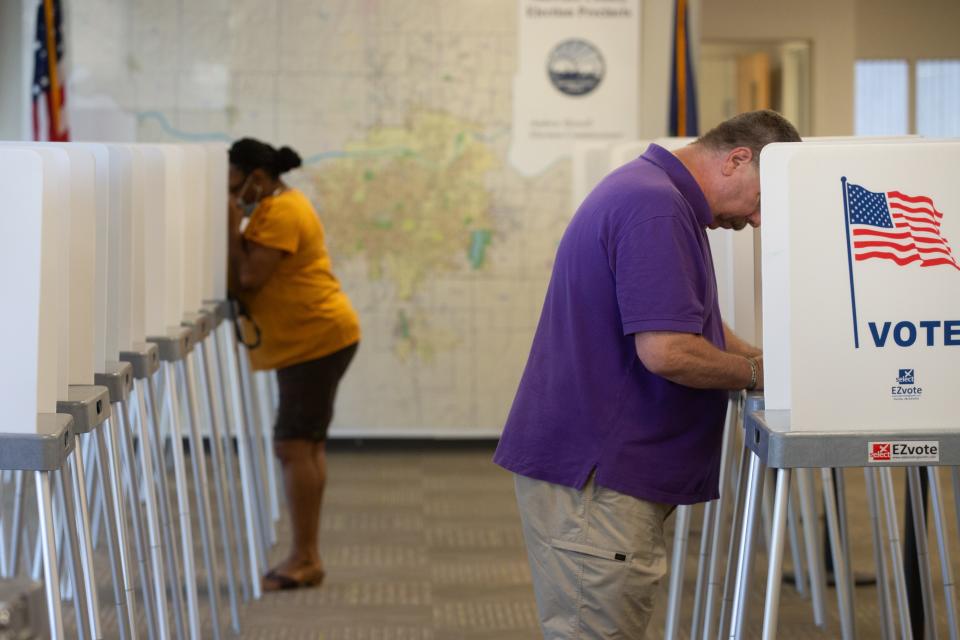Driven by abortion politics, Kansas primary election voters turned out in high numbers

Driven to the polls by abortion politics and unfazed by hot and humid weather, Kansas voters turned out in record numbers to vote in the August primary election.
Unofficial and incomplete election results from the Kansas Secretary of State's Office shows a little more than 900,000 total votes have been counted so far. With more than 1.95 million registered voters, turnout currently sits at about 46.6%.
That number will likely rise as more votes are counted.
"Higher turnout and engagement around this critical issue is something that we absolutely knew was a possibility," said Rachel Sweet, of Kansans for Constitutional Freedom. "I think certainly having increased turnout helped us get across the finish line, but this is an incredibly decisive victory."
At this point, the 46.6% turnout didn't beat out any general election turnout in the past decade, though it is approaching the 2010 general election's 49.7%. But it is substantially higher than any primary election since at least 2010 and is more than double the turnout in 2012 and 2014.
Secretary of State Scott Schwab on Friday had predicted 36% voter turnout. By the time polls closed in the vast majority of the state, Schwab said turnout could reach 50%. That's in spite of long lines and technical issues at some locations, coupled with temperatures exceeding 100 degrees.
"Turnout was a lot higher than we expected — I think than anyone really anticipated — for a primary election," Sweet said.
Kansas voter registration numbers at time Roe v. Wade decision leaked
Unofficial and incomplete statistics show 908,745 total votes cast on the so-called Value Them Both amendment. Unofficially, Kansas had about 1,950,971 registered voters — which appears to be the most registered voters ever.
As of April, Kansas had 1,917,595 registered voters. That was a month before a leak from the U.S. Supreme Court indicated the conservative majority was poised to overturn the landmark abortion rights case Roe v. Wade.
More than 33,000 people registered to vote between then and the mid-July deadline. Data indicate most of those registrations came after the Supreme Court's Dobbs decision in late June — and 70% of those new voters were women, according to an analysis by TargetSmart, a nonpartisan political data organization.
"That day I think was a wake-up call for Kansans who really did think their constitutional rights were protected at the federal level and they found out that day that they were not," said Ashley All, a spokesperson for Kansans for Constitutional Freedom, the main coalition opposing the amendment.
More: Controversial Kansas legislators lose, incumbents fall to conservatives and Topeka-area races set
"Kansas had a unique opportunity to protect their constitutional rights and freedom at a time when those rights have been stripped at the federal level," All said. "So I think that really did motivate and mobilize voters."
In Shawnee County, Election Commissioner Andrew Howell had predicted 38% to 40% turnout. Unofficial numbers suggest turnout for the capital city area is sitting closer to 54.8%.
Grassroots mobilization didn't pan out for Value Them Both

When the Value Them Both Coalition watch party started, Kansans for Life spokesperson Danielle Underwood praised the "largest grassroots mobilization in Kansas history."
With the election called by national news outlets, but shortly before the coalition conceded the race, Melissa Ohden, of the Kansas City, Mo.,-based Abortion Survivors Network told reporters that she thought it was too early.
She said she had spent the previous 72 hours canvassing "across various parts of the state" with former Gov. Jeff Colyer.
"What I saw was not indicative of what I'm seeing reported right now," Ohden said.
More: Kris Kobach wins primary race for Kansas attorney general. His comeback isn't complete yet.
As the watch party wound down, Sen. Molly Baumgardner, R-Louisburg, said fearmongering, media coverage and political spending drove people to the polls.
"The resolve of the opponent was certainly there," she said. "And it really didn't matter how many times they misconstrued that a woman's life was in danger if the constitutional amendment was to pass. So I think when you're looking at more than 50% of our state population is female, and you're saying that to vote yes means potential death to a female, that type of fearmongering is obviously a factor."
Low primary election turnout

Primaries don't typically have high turnout.
Unaffiliated voters, also known as independents, can't vote without declaring a political party. Libertarians rarely, if ever, have a contested primary.
Democrats seldom have contentious primaries, especially for statewide races, leaving little incentive to go to the polls. Indeed, Democrats for all statewide offices ran unopposed, though there was a contested primary in the U.S. Senate race to challenge incumbent Jerry Moran, who was unlikely to lose.
Republicans tend to have the most incentive to vote in a primary. Statewide races are often contested, as are local elections. In some areas, especially in rural Kansas, the GOP primary often decides the race. Republican primaries also tend to draw the party's more conservative base.
More: Conservative challengers take two out of three Kansas State Board of Education primary races
The supporters of the Value Them Both amendment had said they chose a primary election because the question wouldn't get lost at the bottom of the ballot. Opponents alleged it was an attempt to gain an electoral advantage.
"The supporters of the constitutional amendment were very intentional about putting this on an election where they assumed there would be lower turnout, and that more of their voters were likely to show up," said Sweet, of Kansans for Constitutional Freedom.
Historical election turnout in Kansas

2020 general election: 70.9%.
2020 primary election: 34.2%.
2018 general: 56.4%.
2018 primary: 27.1%.
2016 general: 67.4%.
2016 primary: 23.5%.
2014 general: 50.8%.
2014 primary: 20.2%.
2012 general: 66.8%.
2012 primary: 23.2%.
2010 general: 49.7%.
2010 primary: 25.2%.
When will Kansas election results be official?
Ballots sent through the mail will continue to be counted through Friday, as long as they were postmarked on or before Election Day. Local officials must also determine which provisional ballots to count.
The State Board of Canvassers has until Sept. 1 to certify the election results.
Jason Tidd is a statehouse reporter for the Topeka Capital-Journal. He can be reached by email at jtidd@gannett.com. Follow him on Twitter @Jason_Tidd.
This article originally appeared on Topeka Capital-Journal: High primary voter turnout in Kansas abortion amendment election

